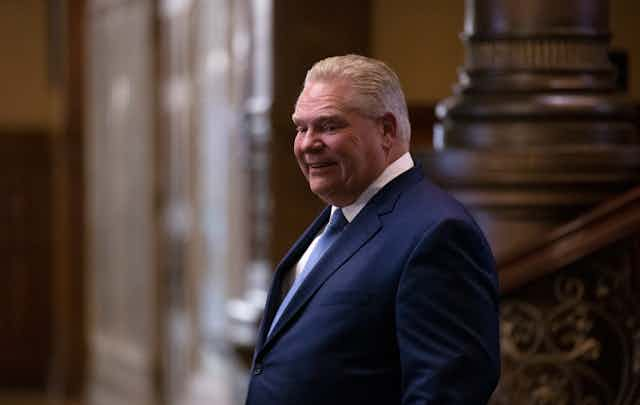On June 2, Ontario residents head to the polls to elect a provincial government. The most likely outcome is that Doug Ford will be re-elected premier of the province and his Progressive Conservative party will win the most seats.
Some people in the province will be frustrated or puzzled by such an outcome, especially in light of the hardships so many Ontarians have endured over the last few years during the COVID-19 pandemic.
The Ford government, after all, has largely failed in terms of legislative achievements, protecting citizens from COVID-19, shielding people and small businesses from the economic stress of the pandemic and basic responsible leadership. So why will so many people vote for Ford and his team again?
Some political scientists and campaign strategists often tend to misunderstand elections. Politicians like Ford don’t. This explains why he’ll win again.
No platform? No problem!
Let’s first consider the role of party platforms: In 2018, when Ford first ran for premier, the Progressive Conservatives didn’t bother to release a detailed party platform.
In other words, the party didn’t have any major legislative goals in mind. Its one major claim was that government was wasteful and Ford intended to curtail spending. This is a fairly innocuous and oft-repeated conservative mantra. But even without a detailed party platform of any sort, the Conservatives swept into power.
It was a brilliant and audacious strategy for Ford to deploy. What lessons did the Liberals and NDP learn from that election? None.
The NDP recently published its 95-page party platform, with details on rent control, universal pharmacare and money for support workers.

The timing and the hoopla about its release six weeks before the election indicated just how important the NDP thinks its platform is to the election. But anyone able to wade through that document is likely a policy wonk or someone already voting NDP. It’s not a document designed to persuade.
If a politician or a political party believes voters cast ballots in favour of policy positions laid out in a party platform, then they badly misunderstand persuasion and what it takes to motivate a voter.
All of the resources that the NDP and the Liberal Party pour into the details and the rationales of their policy positions are misguided if the assumption is that these platforms will result in votes. Clearly these political parties spend resources — time, money and talent — devising their policy initiatives, but elections are not really about policy positions.
What, then, does motivate people to cast a vote for a candidate?
How do candidates make people feel?
The first and perhaps most important point is that elections are communication challenges, and communication is not a rational process of information transmission.
In other words, if politicians think they’re good communicators because they’re deftly able to convey accurate information about policy positions, then those politicians are likely terrible at communication.
We see this when candidates tweet out their policy positions and remind voters during debates or when door-knocking that they favour affordable housing — or whatever policy position they think will appeal to specific voters.
They should stop doing that. Communication is a process of producing an impact on others, not transmitting information on policy goals.
This is the first question political parties need to ask heading into any election campaign: How does their candidate make people feel? And how does the party affiliation of that person influence how people feel about that candidate? These questions get us closer to an explanation of what motivates people to vote.
Persuasion is a strategic art of communication that leverages emotions for motivation. What’s known as the somatic marker hypothesis teaches us that our reasoning is always biased by our emotions, something Greek philosopher Aristotle knew 2,500 years ago when he penned The Rhetoric, his masterpiece on persuasion.
How we feel about New Democrat Andrea Horwath or Liberal Steven Del Duca will influence what we think about their positions, and how we feel about their parties will bias how we feel about them as candidates.

Identity, clear narratives
People also tend to vote according to their group identities. Identity is the second biasing filter for decision-making in elections. The process of “identification” is the communication challenge of making people feel as if they have something in common.
Famed rhetorical theorist Kenneth Burke claimed that “persuasion is identification.”

Ford is arguably better at this than his rivals for premier, Horwath and Del Duca, but there are many high-profile examples of politicians who have tried and failed to make voters feel like they identify with them. Most recently, the advertisements for former federal Conservative leader Erin O'Toole come to mind, when the party tried to portray him as a kind of hard-working everyman.
Elections are also about values, stories and rhetorical framing. Conservatives around the world often say they value freedom and have created narratives about how governments infringe upon freedom and are wasteful. Their policy positions, when they do have them, tend to manifest or make clear their commitment to the value of freedom.
Ontario’s left-leaning parties lack any similar, larger narrative. They don’t clearly champion a coherent and inspiring set of values, and they don’t make us feel hopeful about the future.
That’s why they’re going to lose again, even though their policy positions would likely do a lot of good for a lot of people in the province of Ontario.

